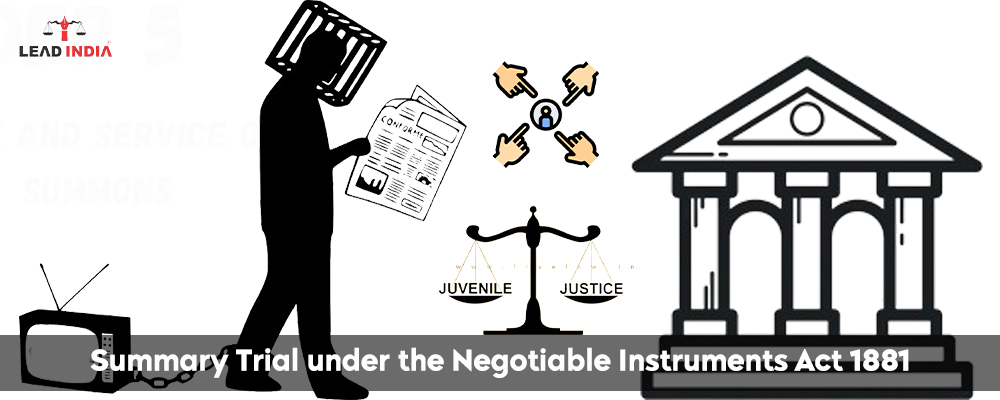A significant piece of legislation that regulates the use and enforcement of negotiable instruments in India, notably promissory notes, bills of exchange, and cheques, is the Negotiable Instruments Act of 1881. The Act’s provision for summary trials for matters involving bounced cheques is one of its most significant features. A summary trial preserves the rights of all parties associated while simplifying the judicial system and ensuring swift resolution.
What is a Summary Trial?
- According to Section 260 of the Criminal Procedure Code, any Chief Judicial Magistrate, Metropolitan Magistrate, or First-Class Magistrate who has been specially authorized by the High Court in this regard may, if he deems it appropriate, try in a summary manner, among other things, offenses that are not punishable by death, life in prison, or a term of imprisonment longer than two years.
- However, in accordance with The Negotiable Instruments Act, 1881, the magistrate may, in a summary trial, sentence a defendant to a year or more in prison and up to a fine of five thousand rupees.
Need A Legal Advice
The internet is not a lawyer and neither are you. Talk to a real lawyer about your legal issue

Procedure of Summary Trial under the Negotiable Instruments Act 1881
A quick and efficient legal process for recouping funds based on written contracts, bills of exchange, promissory notes, and other comparable documents is offered by CPC Order XXXVII of the Civil Procedure Code.
Notice Issuance
The payee or the holder, upon learning of the dishonored cheque, issues a notice to the drawer requesting payment within an agreed-upon period of time, generally fifteen days.
Reply from the Drawer
The payee or holder can start legal procedures by sending a complaint before the appropriate court having jurisdiction over the issue if the drawer fails to complete the payment within the time frame specified.
Complaint Filing
In compliance with Section 138 of the Negotiable Instruments Act, 1881, the complaint must contain all pertinent information, particularly the contents of the cheque, the dishonor date, the rationale for the dishonor, and the payment request.
Summoning of Parties
The court summons the accused (drawer) and the party who complained (payee/holder) to show up before it on the day specified after accepting the complaint.
Examination of Evidence
The court examines the evidence that was initially submitted by both parties during the trial, including the demand letter, the cheque, and any other relevant paperwork or witnesses.
Decision and Judgment
The court delivers a decision, finding the accused guilty or not, based on the proof presented and arguments put forward. If found guilty, the judge can impose the Act’s specified penalties, which include imprisonment or a cash penalty.
Why Follow the Norm of Summary Trial Under the Negotiable Instruments Act 1881?
- Compared to warrant and summons proceedings, summary trials are simpler concerning cheque bounce cases.
- Compared to other trials, the summary case method is quicker and less involved concerning the cheque bounce case.
- In contrast to significant matters that are tried in summons/warrant trials, summary trials handle cases involving minor offenses of a basic kind.
- In summary trials, the magistrate is not required to file formal charges against the defendant. A formal charge must be recorded in other trials.
- The complete recording of the evidence is not necessary in summary trials. A succinct synopsis is effective. It is essential that all of the evidence be fully documented in additional trials.
The Indian judiciary is actively working to change in order to better serve the people of the nation by saving them time and eliminating the need for boring court appearances. This is being accomplished by increasing the judicial system’s awareness, activity, and overall public welfare. This action benefits the public as well as the legal system by clearing the backlog of cases.
For any type of legal assistance, one can talk to lawyer from Lead India. Lead India provides free online legal advice in India. With Lead India, one can ask free online questions of the experts in addition to getting free legal advice.



